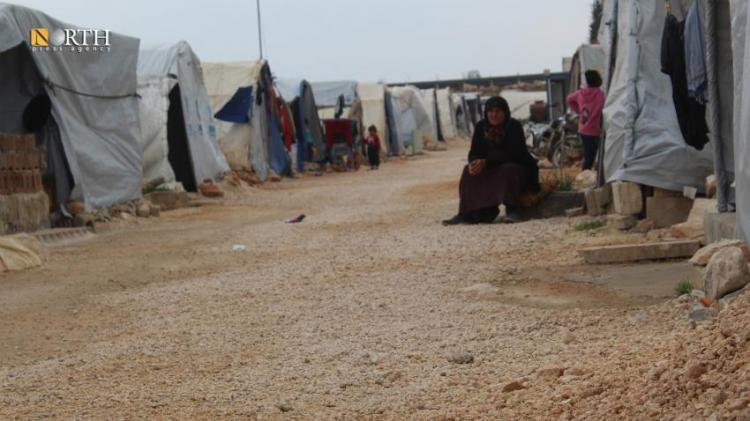"No taste for Eid since we were displaced from Afrin": a three-year story of displacement camps
Northern Aleppo countryside – Dijla Khalil – North-Press Agency
40 km away from their hometown, for three consecutive years, Afrin’s displaced people receive their Eid feast in the absence of most of its atmosphere. According to them, nothing indicates the passage of Eid in the camps they live in in the northern countryside of Aleppo. Displacement, dispersion of family members, and their separation from their homes and villages all steal the joy of Eid from them.
1,765 displaced families from the Afrin region , northwestern Syria, which includes 7,044 people, live in five camps in the northern countryside of Aleppo (al-Awda, Barkhwadan, Sardam, Shahba, and Afrin), according to the latest statistics of the Social Affairs Authority in the Autonomous Administration in Afrin.
Zahida Manan Abdo, a displaced woman from Qurna village in Afrin's Bulbul district, is sitting in front of her tent in Barkhwadan camp in Fafin village. "When Eid is mentioned, I remember how I used to spend it in my village, because my children and my grandchildren were gathering around me. I used to give them candy and exchange visits with the villagers," she says.
"There is no taste for Eid in the camps; we are far from our homes," added Abdo, whose features do not inspire the joy of Eid.
The case of Ruwaida Bakr, displaced from the village of Jagla in Sheikh Hadid, is no different. "From the day we displaced from Afrin, Eid was absent. My family was separated due to the war. Each of them went to a different place and I could not visit the graves of my relatives, because of the takeover of Turkey and its affiliated armed groups over Afrin," Bakr added, shedding tears that she was "sorry for the atmosphere of Eid that she lost after being displaced from Afrin and before Turkey and its opposition groups took control of it. Eid meant joy and happiness to us, but we no longer felt its taste while I was away from my home and my olive trees."
Eid al-Fitr was preceded by preparations in Afrin's displacement camps, where women were forced to rely on food basket ingredients provided by the Autonomous Administration to prepare Eid pastries. The manufacture of pastries in tents came to bring happiness to the souls of children and feel the taste of Eid, but for adults, "Eid is no longer a joy after we moved away from Afrin," according to women displaced from the region.
Mahmoud Ibrahim Muhammad, displaced from Qoshu village in Bulbul, remembers the atmosphere of Eid that he used to spend in his village. "We used to visit graves and perform Eid rituals in the village mosque, and we gave sacrifices during the feasts, so the people gathered to have lunch in the village center," he added, sighing. "In the camp, we only greet each other and exchange visits only. There is no taste for Eid. I am far from my village customs. All days are the same since we were displaced."

